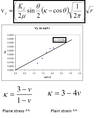Lecture 16 - Experimental fracture mechanics (moire, DIC, Thermoelasticity) Flashcards
(8 cards)
What are 3 issues Moiré interferometry has to address to be feasible for exploring stress field around the crack tip
Resolution (of spatial detail at crack tip Minimisation of Information Loss (doue to out of plane deformation around crack tip) Replicating gratings (in crack tip region without damaging crack tip geometry)
How are the 3 issues (resolution, information loss and gratings) overcome?
Resolution - High magnification and grating density
Information loss cause shadow spots - use low f number lens
Applying gratings - protect crack tip withtape or sealant
Describe the selected line approach
Draw a ____ for theta=___
Calculate the _____ _________ ______ (Kap) at each intersection
Plot against __
Extrapolate linear section to give KI (at _________)
Line, pi/2
Stress intensity factor
square route of r
intercept

Mole has worked examples of CTOD concept and moire application. what does CTOD stand for?
Crack Tip Opening Displacement
Equations of components of loading for both modes can be written in terms of _____ and thus _____________
Plotting displacement against square root of r gives us the ________, allowing us to work out (if we have shear modulus and theta) the stress intensity factor, depending on if _______ ____________ and thus value for k is under _____ stress or strain conditions.
strain
displacement
gradient
surface measurements
plane

The picture starts with the equation for the thermoelastic signal, S.
For a pure mode 1 crack, what would r need to be in terms of to calculate Smax?

KII disappears under mode 1 loading.
r in terms of y and theta.
Along the line parallel to the crack, y is constant and so Smax is when theta = 60
Rearrangement of equation for y, allows S to be plotted against x and thus Smax read off the graph.

Having plotted S against x for lots of y values, How is KI obtained?
Gradient of graph of y against 1/Smax 2
Worked example on mole
Give 1 implication of thermoelasticity being non contact
Can be applied during fatigue tests


